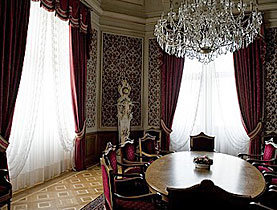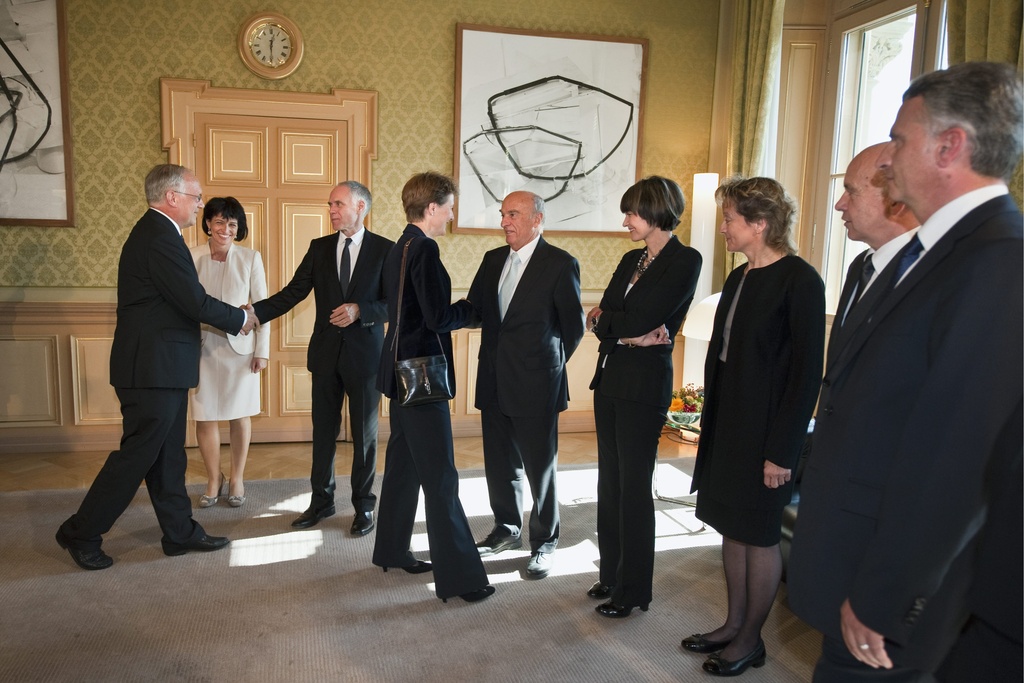Poll finds political centre-right holds sway

The centre-right appears to have consolidated its position, but it is broken up more than ever into different political parties 12 months ahead of parliamentary elections.
A nationwide survey also found the rightwing Swiss People’s Party, which won 28.9 per cent of the vote in 2007, has the potential to remain the largest group.
The findings, published on Thursday by the gfs.bern research and polling institute on behalf of the Swiss Broadcasting Corporation, apparently confirm a shift away from a strong polarisation of the political forces.
But Claude Longchamp, political scientist and head of the research institute, stressed that it is not possible to predict trends.
“The data serves merely as a starting point to make comparisons during the election campaign,” he said.
It was too soon to look for signs of major political change, as the survey showed a majority in favour of stability in the make-up of the multi-party cabinet.
The Swiss seem conservative when it comes to the current structure of the government and alliances between like-minded parties are not very popular, according to Longchamp.
Potential
Two new centre-right parties, the Liberal Greens and the Conservative Democrats, appeared to be steadily winning ground and have a potential – albeit limited – to attract new voters.
They had succeeded in establishing a clear profile appealing to certain segments of society – to a certain extent even across party lines.
The rightwing People’s Party is known for its clear anti-European and anti-foreigner stance and its supporters are to be found in all social groups. It has also become the political home of the less skilled and less affluent electorate.
However, Longchamp points out that a renewed triumph in the 2011 election hinges on its ability to mobilise its supporters, notably among far-right voters.
“A lot depends on the party’s election platform – the issues and the dynamics of the campaign,” he says.
As for the centre-left, the Greens appear to have lost some of their appeal to voters, while the Social Democrats remain at around 20 per cent.
The two oldest parties, the Radicals and the Christian Democrats, have also remained stable. One year before the elections the Radical Party holds on to its three per cent lead over the Christian Democrats – not least as a result of a merger with the Liberals.
In line
Longchamp’s findings are largely in line with estimations by Michael Hermann, a political scientist at Zurich University.
He believes the People’s Party can rely on a considerable proportion of xenophobic voters who feel marginalised by the effects of an increasingly interconnected world and its impact on society.
“The same can be found in other European countries where populist parties represent the opposition to globalisation and modern society.”
The centre-left does not really have more scope to grow. Hermann believes voters might move between the Greens and the Social Democrats.
His verdict on the chances of the centre-right Radicals and Christian Democrats is that they will continue to struggle to hold on to the present keep their percentage of votes.

More
House of Representatives
The survey is based on interviews with 2,018 Swiss citizens across the country.
However, the Swiss abroad community was not polled.
The survey was carried out between late September and mid-October 2010.
The margin of error is 2.2%.
The poll was carried out by the gfs.bern institute on behalf of the Swiss Broadcasting Corporation, swissinfo’s the parent company.
Six other polls are to follow in the run-up to the elections on October 23, 2011.
Parliament, made up of the House of Representatives and the Senate, has 246 seats and is elected for four years.
The current term ends next year.
At least 12 political parties represented the political spectrum from the Federal Democratic Union to the Communist Party.
The five main parties are the People’s Party, the Social Democrats, the Radicals, the Christian Democrats and the Greens.
The Conservative Democrats and the Liberal Greens are more moderate split offs from the People’s Party and the Green Party respectively.
(with input from Armando Mombelli)

In compliance with the JTI standards
More: SWI swissinfo.ch certified by the Journalism Trust Initiative













You can find an overview of ongoing debates with our journalists here . Please join us!
If you want to start a conversation about a topic raised in this article or want to report factual errors, email us at english@swissinfo.ch.